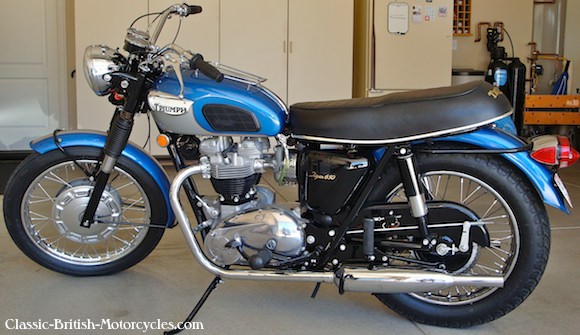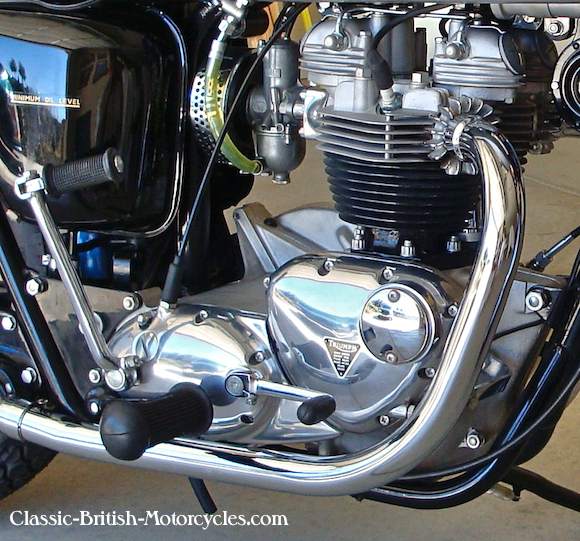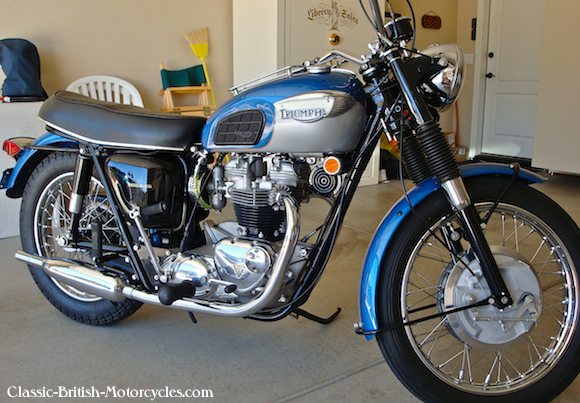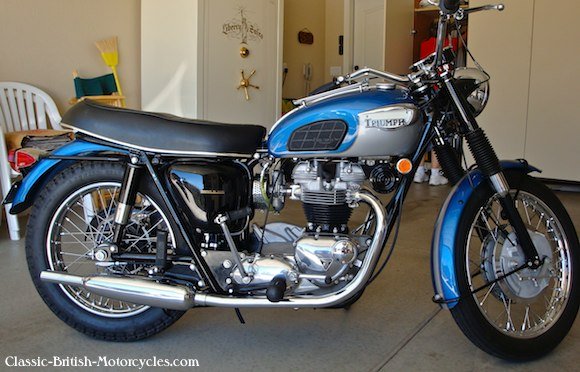1968 TRIUMPH TR6 NOMENCLATURE
For years, every Triumph TR6 was referred to as a Triumph Trophy, but that was soon to change. For the first time, for the 1968 model year, the name “Trophy” was dropped. By the following year, the new name of Triumph Tiger would be adopted. Since the original Triumph T110 Tiger had recently been dropped, it freed up the name for TR6 duty. Models for the 1968 Triumph TR6 line were the Standard TR6, the TR6R Roadster, TR6C Competition & the TR6P for Police duty. Engine & frame numbers ran from DU68364 to DU85903 with build dates running from August 9, 1967 to June 26, 1968.

ENGINE UPGRADES
The exhaust cam was replaced with the more radical E3134 racing cam, making both the intake (inlet) & exhaust cams the same, which it now had in common with the Bonneville. 1-1/8-inch cam followers continued to be specified for both inlet & exhaust. The ‘Red Dot’ outer valve springs were replaced by ‘Green Dot’ springs with 10% more load when fully open, but retaining the original loading when closed. Starting with Engine #DU81209 the internal oilways in the rocker arms were deleted, adding strength to cope with the stronger springs. Stronger connecting rods with a greater cross-section & the H&G pistons were redesigned (removing the bar under the crown & thickening the ring groove-area. Left-hand threads were specified for the tachometer (rev counter) drive. To make more room for wrenches (spanners) the cylinder base nuts were changed to 12-points.

TIMING IS EVERYTHING
For the 1968 Triumph TR6, there were 3 different ignition timing regimens indicated on the crankcase & flywheel providing TDC (Top Dead Center) & 38-degrees BTDC (Before Top Dead Center):
MkI – The timing plug was located at the lower front of the crankcase, with only one hole or slot in the flywheel below the crankshaft bobweight. This gave 38 degrees BTDC.
MkII – Two timing plugs were fitted to the crankcase, the first the same as the MkI, the other behind the cylinder block. The flywheel holes were situated one below the bobweight & one above, giving 38-degrees BTDC & TDC.
MkIII – Timing plug was behind the cylinder barrel & the flywheel had two slots above the crankpin, giving 38-degrees BTDC & TDC. MkIII began with Engine #DU74052.
GEARBOX STUFF
Lots of internal changes were made to the gearbox including the mainshaft high gear, oil seals, clutch operating mechanism & the whole thing was converted over to UNF threads. The 1968 Triumph TR6 got a new primary cover with a round removable inspection plate over the rotor to aid ignition timing. And staring with Engine #DU85346 a pointer was added to the crankcase to aid in the process.
FRAME MODS
The anti-theft steering lock was improved. The rear was modified to mount the left side cover, which contained the toolbox. A stronger swingarm was introduced at #DU81209 with 12-gauge instead of 14-gauge tubing & heavier corner gussets (fillets). These strengthened swingarms can be identified by the letter “X” stanped onto their pivot tube. The 1968 Triumph TR6 got a new one-piece forged steel kickstand (prop stand).
BIG NEWS: NEW TLS FRONT BRAKE
The 1968 Triumph TR6 received an all-new 8-inch TLS (Twin Leading Shoe) front brake, arguably the best Triumph Motodycles ever put on a classic Triumph. It worked very well & it looked great.
ELECTRICAL CHANGES
The Zener Diode gained a finned heat sink & was moved from the battery tray to a the front of the bike, under the headstock, where it could get more cooling air. A new 5-1/4″ headlight housed a 3-position light switch, a Lucas ammeter & warning lights. Lucas 6CA contact breakers now allowed (required) each side to be independently set. This larger unit forced the condensers to be moved to another location, under the front petrol tank mounting bracket. At #DU82146 lubricating felt wicks were added to the the breakers to combat premature wear. OTHER CHANGES
US models got safety reflectors mounted on either side of the tank under the nose. After #DU81209, the front tank mounting studs were replaced with bolts. From #DU82574, the TR6C’s high pipes got an “H”-section connecting the two pipes just upstream of the silencers to try to quiet them, in anticipation of impending noise regulations. The front mudguard (fender) was lengthened slightly on all models except the TR6C. A new seat with external hinges had a gray ribbed top, white piping, black sidewalls & chrome plastic beading around the lower edge. The new seat pan had threads to accommodate a new passenger grab rail (on US models only).
CHANGE TO “UNIFIED” THREADS
After eons of using the old British Standard Cycle (BSC) system for all their nuts, bolts & threads (also known as Cycle Engineers Institute, or CEI), with the 1968 Triumph TR6 & the entire Triumph Motorcycle lineup, the process of changing over all threads to UNF (Unified Fine) & UNC (Unified Course), also known (in America, at least) as “American threads” (no offense to our British mates). Not everything could be changed over at once, so there are quite a mixture of threads & bolt-head sizes on 1968 & 1969 Triumph Motorcycles. An interesting sidenote: even the Americans were leaving ‘American threads’ in favor of the Metric system. Why did Triumph go through all the trouble & expense of changing all the threads, then convert them to another antiquated system that was on its way out? I guess this was indicative of the thinking at that time. And of course, the US market was, by far, the largest retail market for British Motorcycles. Perhaps they thought they were paying homage to the Yanks by using ‘their’ threads. Either way, if you’re working on a 1968 Triumph TR6, you’d better have two sets of wrenches & sockets, one American & the other Whitworth.

1968 Triumph TR6 SPECIFICATIONS
|
Model Designations: TR6 TR6C TR6R TR6P Engine Type Displacement Bore & Stroke Compression Carburetor Ignition Engine output Primary drive Primary sprockets Clutch Gearbox Ratios, overall: 1st, bottom 2nd 3rd 4th, top Final drive Final sprockets Frame type Suspension, front Suspension, rear Brake, front Brake, rear Tire, front Tire, rear Fuel Capacity Wheelbase Seat height Ground clearance Dry Weight |
Standard Competition/Off-road Roadster Police Air-cooled OHV vertical twin 649cc / 40.0 ci 71mm X 82mm / 2.79″ X 3.23″ 8.5:1 1- Amal Concentric, 30mm Battery & coil, Lucas 42 bhp @ 6500 rpm 3/8″ triplex chain X 84 links Engine 29T X Clutch 58T Multi-plate, wet 4-speed constant-mesh, right-foot shift — 11.8:1 8.17:1 6.76:1 5.84:1 5/8″ X .400″ X 3/8″ chain X 106 links Gearbox 19T X Rear 47T Brazed lug, full-cradle, single downtube Telescopic fork, hydraulic damping Swing arm, 2 Girling dampers 8″ SLS drum, full-width 7″ SLS drum, one-side 3.25″ X 19″ Dunlop 4.00″ X 18″ Dunlop 2.5 Imp gal (US)/4 Imp gal (UK & export) 54.5″ / 140.3 cm 32.5″ / 77.5 cm 5.0″ / 12.7 cm 380 lbs / 173 kg |


